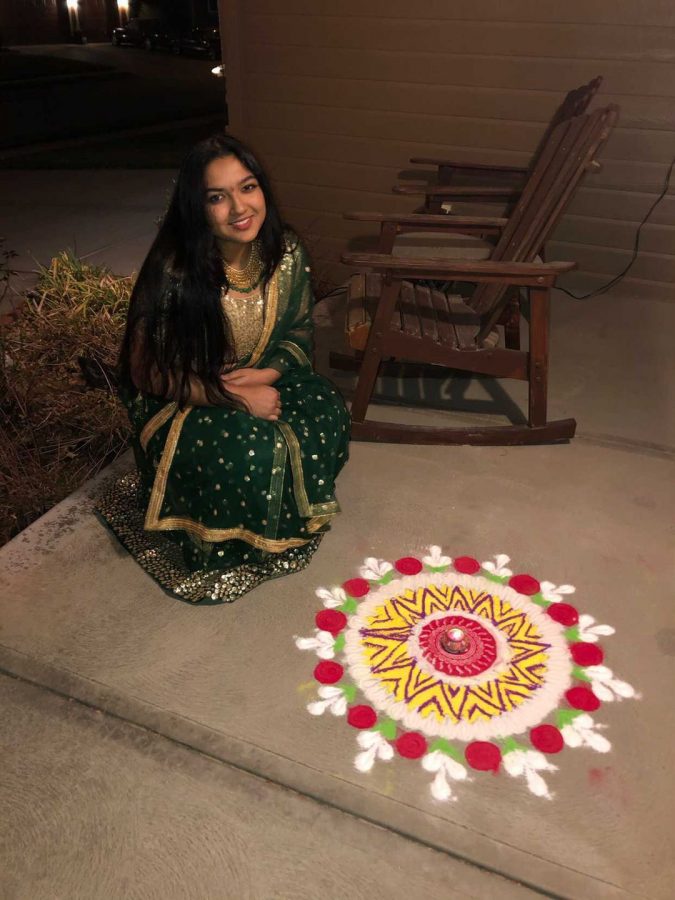Fancy festival
Senior celebrates Diwali
Shreeya is pictured wearing her new Indian clothes with the rangoli her mom and her made. She celebrated Diwali “festival of lights” on November 14th. “This day celebrates the return on Rama, an incarnation of Lord Vishnu, and his wife Sita, an avatar of Goddess Lakshmi, to Ayodhya,” senior Shreeya Mishra said. “ After his 14 years in exile, Rama returns after defeating the evil Ravana, which is why this day celebrates good over evil. Because of their return the residents of Ayodhya had a celebration and lit clay lamps.”
December 3, 2020
Wearing the finest clothes, performing prayers for the Goddess Laxmi and using colorful powder to make rangoli on the floor, are some of the common traditions for the holiday Diwali. When October and November roll around the holiday is a major focus for senior Shreeya Mishra and her family.
This year Diwali was celebrated November 14. It’s commonly known as the “festival of lights,” a holiday celebrated largely by Hindus and one of the biggest festivals in India. The festival symbolizes the spiritual victory of light over darkness, good over evil or knowledge over ignorance.
“During this celebration we pray to the Goddess Laxmi and Lord Ganesh,” Shreeya said. “We light firecrackers, candles and diyas, which are clay lamps to signify the victory of light over darkness. We also make rangolis, which are patterns made with colored powder on the floor and go to friends’ houses and deliver sweets we have made.”
On Diwali, it is common for people to wear their trendiest clothes and dress up to honor the festival. This clothing includes modest new pieces. Women wear saris, a garment that wraps around the waist, and draped over the shoulder. It is typically made from fabrics such as silk, chiffon or velvet. Men wear kurtas, a shirt worn with a tie around the waist.
“I love dressing up in my Indian clothes because I feel like a prince in them,” brother Shaurya Mishra said. “I also like to help my dad set up the clay lamps.”
Shreeya featured her pictures on her Instagram showing all of her followers her new sari and a rangoli her mom made on the porch. As it is for many holidays, Diwali is no different, there is an abundance of snacks and sweets to enjoy. Shreeya and her mother make special foods related to Diwali.
“My mom usually makes Ladoo which is a sphere shaped sweet, Chakli, a fried snack in a spiral shape and Kheer, a sweet pudding,” Shreeya said. “Many other things are made during the Diwali season, but my family mainly makes these three.”
Getting together with friends and family is a major part of the festival. A sense of togetherness is built. With a holiday that is not as widely known as Christmas or Hanakkah, it’s even more special to celebrate with loved ones.
“I think the holiday brings us together as a family because the kids learn about family traditions,” mother Vijaya Mishra said. “They learn recipes and rituals needed to be performed for prayers. I think it is important to do this even though we don’t live in India. I appreciate that we are close to our culture even though we are far from the country my husband and I grew up in. I hope they pass on these traditions to their children as well.”
Because Shreeya did not grow up in India like her parents, she has learned a lot of the traditions and religion from her parents.
“This holiday is special to me,” Shreeya said. “It’s the only time I get to wear beautiful outfits and get dressed up. I feel connected to my family in India through this holiday as well. I feel especially connected with my ancestors and religion during this time.”
While making the food, rangolis, and dressing up are all the fun parts of the festival, it holds a deeper significance for Shreeya and her family as they become closer through their celebration of Diwali.







